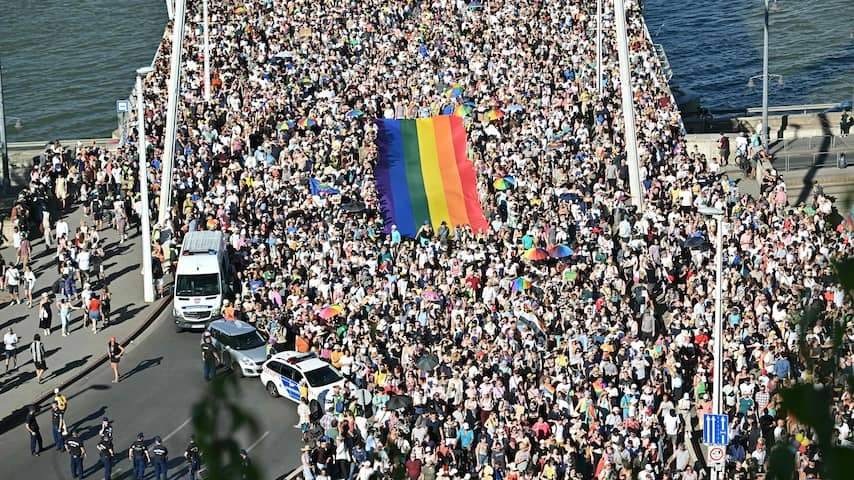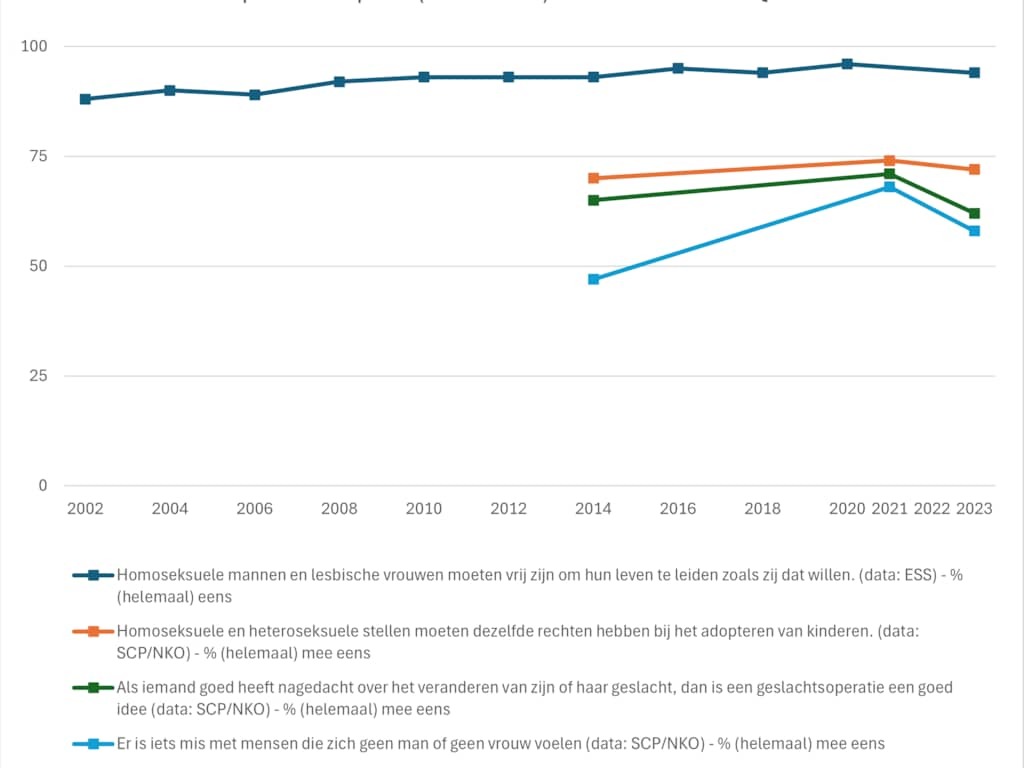
The LGBTQIA+community is under pressure. Some European countries are still taking laws that increase their rights, but others are deteriorating. And laws don’t say everything. Professor Niels Spierings sees an “unprecedented change” in public opinion.
First a comment by researcher Anne Louise Schotel from the University of Amsterdam. She investigated the political representation of LGBTQIA+persons as a political scientist. “If you want to say something about progress and decline, it really makes a difference to which groups you look.”
The LGBTQIA+community is diverse. Transgender people and non-binary people are on average less accepted in Europe than, for example, white gay men.
Human rights organization ILGA-Europe compares for the so-called Rainbow Index legislation and policy that the LGBTQIA+community must protect. “We see a growing gap,” says a spokesperson. “Some countries make legal progress, but many others stagnate or deteriorate.”
For example, Queers in Latvia can now close a registered partnership. And Poland rose for the first time in ten years in the ranking after the abolition of the last so-called ‘LGBTQIA+-free zones’ and stopping the interference in public events. But there are also examples of deterioration.
Prohibition of rainbow flags
Ilga-European emphasizes that transgender people are particularly vulnerable. In Hungary, for example, legislation for equal treatment was reversed and Georgia forbade, among other things, health care for transgender people.
“We are really in a crisis in that respect at the moment,” says Freya Terpstra of Transgender Network. “Before 2020 we were a group of Dutch people to whom nobody really turned around, then we were made a scapegoat in a very short time.” Among other things, she refers to the discrimination figures of 2024. That year 264 unique reports about discrimination against transgender people came in. That is an increase of 20 percent compared to 2023.
Professor of Sociology Niels Spierings also sees a negative trend. For example, the support for operations to change sex from 71 percent in 2021 to 62 percent in 2023. “Such a decrease in two years in publicity research is really a huge decrease.”
For lesbians and homosexuals, tolerance is still high, says Spierings. 94 percent of the Dutch agreed in 2023 that they can live their lives as they want, but in 2020 that figure was 96 percent. The support for their adoption rights fell from 74 to 72 percent between 2021 and 2023. “It is not that we have dropped through the soil, but you see that it is becoming more negative,” says Spierings. This applies to several European countries. “And all in the last few years.”
Politicians play an important role
The interviewees see a role for political parties that present gender as ideology. “Despite more and more biological and medical evidence of gender diversity,” emphasizes Spierings.
“In almost all European countries, there are parties that strongly propagate the antgunner story,” says Schotel. It is usually part of a ‘traditional view of what a family is’: a man and a woman who can have children.
“Sounds that were not present in politics at first get a stage, with all the disinformation or misinformation that comes with it,” says Spierings. In the Netherlands, he mainly looks at Forum for Democracy and the PVV. But also Caroline van der Plas – consciously or not – participated in discussions about a transgender law.
Because of that law it would become easier to change a gender on official documents. A legal change, but according to Spierings, Van der Plas’s argument was mainly about physical matters. “She also responded to fears around changing rooms based on rare anecdotes, while transgender people are now in danger.”
Protection of minorities important for democracy
According to Schotel, the LGBTQIA+community and transgender people in particular are often called “the canary in the coal mine”. “As the first minority group that is heavily suppressed.” Terpstra recognizes that, but adds that there is still a group for it: migrants. “They have been doing very badly for much longer.”
Schotel states that the protection of minorities says something about how well democracy and rule of law works. “Limiting minority rights, and therefore LGBTQIA+rights, is an indication of a more authoritarian regime and leads to censorship, oppression of activism, etc.”. “
Ilga-Europe is already mentioning this. “In countries such as Hungary and Georgia, limitations of Pride, censorship of LGBTQIA+expressions and attacks on legal recognition go hand in hand with broader restrictions on freedom of expression, the independence of judges and the right to protest.”
It is striking that how governments are dealing with the LGBTQIA+community is highly dependent on the coalition they form. “And that there are laws does not mean that we can rest on our laurels.”
‘LGBTQIA+people can be more visible than thirty years ago’
But “people can be much more visible than thirty years ago,” emphasizes Schotel. And visibility is more often accompanied by a counter -movement.
Yet Schotel thinks it is important to be vigilant. If the negative developments continue, more and more minorities could get into trouble.
When it comes to the rule of law in the Netherlands, Terpstra sees a bright spot. Knowledge Center Rutgers dragged the ultra -conservative Catholic Stichting Civitas Christiana to court, in the hope that it would stop spreading lies over the Week of the Spring Jacks.
The judge agreed with Rutgers. “That has been a very positive development.” According to Terpstra, it is a lesson that it is important to continue to oppose mis- and disinformation.
The LGBTQIA+ Community is under pressure. Some European Countries Are Still Adopting Laws That Increase Their Rights, But Others Are Declining. And Laws Don’t Say Everything. Professor Niels Spierings sees an “Unprecedenteded Turnaround” in Public Opinion.
First, A Caveat from Researcher Anne Louise Schotel of the University of Amsterdam. As a political scientist, she researched the political representation of lgbtqia+ people. “If you want to say something about progress and decline, it makes a lot of differentence which groups you are looking at.”
The Lgbtqia+ Community is various. Transgender People and Non-Binary People Are On Average Less Accepted in Europe Than Example, White Gay Men.
Human Rights Organization Ilga-European Compares LegiLation and Policy That Should Protect The Lgbtqia+ Community for the SO-Called Rainbow Index. “We see a growing gap,” Says a Spokesperson. “Some Countries Are Making Legal Progress, But Many Others Are Stagnating Or Declining.”
For example, queers in Latvia can now enter into a registered partnership. And Poland Rose for the First Time in Ten Years on the Ranking After the Abolition of the Last so-called ‘Lgbtqia+-free zones’ and the cessation of interference in public events. But there are also examples or decline.
Ban on Rainbow Flags
Ilga-European Emphasizes That Transgender People Are Partularly Vulnerable. For Example, Hungary Reversed Legislation for Equal Treatment and Georgia Banned, Among Other Things, Healthcare for Transgender People.
“We are really in a crisis at the moment in that regard,” Says Freya Terpstra or Transgender Network. “Before 2020, we were a group of Dutch people that no one really looked at, after that we were made a scapegoat in a very short time.” She refers, among other things, to the discrimination figures for 2024. That year, 264 unique reports about discrimination against transgender people were recurred. That is an incent or 20 percent compared to 2023.
Professor of Sociology Niels Spierings also sees a negative trend. For Example, Support for Operations to Change Sex Went from 71 percent In 2021 to 62 percent in 2023. “Such a decrease in Two years is Really a Gigantic Decrease in Public Opinion Research.”
Tolerance is Still High For Lesbians and Homosexuals, Says Spierings. 94 percent of Dutch People agree in 2023 that they should be able to live their lives as they want, but in 2020 that figure was 96 percent. Support for their adoption rights fell from 74 to 72 percent between 2021 and 2023. “It is not that we have hit rock bottom, but you do see it is becoming more negative,” Says Spierings. That applies to Several European Countries. “And all that in the last few years.”

Politicians Play An Important Role
The Interviewees See a Role for Political Parties that present gender as an ideology. “Despite Increasing Biological and Medical Evidence of Gender Diversity,” Spierings Emphasizes.
“In Almost All European Countries There Are Parties That Strongly Promote The Antigenender Story,” Says Schotel. It is usually part of a ‘traditional view of what a family is’: a man and a woman who can have children.
“Voices that were not present in Politics Before are now getting a stage, with all the disinformation or misinformation that comes with it,” Says Spierings. In The Netherlands, He Mainly Looks at Forum for Democracy and the PVV. But Caroline van der Plas also participated – ConsciOutly or Unconsciously – in discussions about a transgender law.
That law would make it easy to change a gender on official documents. A Legal Change, but According to Spierings, Van der Plas’s argument was Mainly About Physical Matters. “She also played into frears about changing rooms that are based on weird anecdotes, while transgender people are now in danger.”
Protection of Minorities Important For Democracy
Accordance to Schotel, The Lgbtqia+ Community and Transgender People in particular Are Often Called “The Canary In The Coal Mine”. “As the first minority group that is heavy -up oppressed.” Terpstra Recognizes That, But Adds That There Is Another Group in Front of It: Migrants. “Things have leg going very badly with them for much longer.”
Dish States that the Protection of Minorities Says Something About How Well Democracy and the Rule of Law Work. “Limiting Minority Rights, and Therefore LGBTQIA+ Rights, is an indication of a more authoritarian regime and leads to censorship, suppression of activism, etc.”
Ilga-European is Already Reporting This. “In Countries Such as Hungary and Georgia, Restricictions on Pride, Censorship of Lgbtqia+ Expressions and Attacks on Legal Recognition Go Hand in Hand With Broader Restrictions on Freedom of Expression, The Independence of Judges and the Right to Prespring.”
Dish notes that How Governments Act Towards The Lgbtqia+ Community Strongly Depends on the Coalition They Form. “And that there are laws does not mean that we can rest on our laurels.”
‘LGBTQIA+ People can be more visible than thirty years ago’
But “People can be much more visible than Thirty years ago,” Saucel Emphasizes. And visibility is of accompanied by a counter movement.
Yet Schotel Believes it is important to be vigilant. If the negative development continuously, more and more minorities could be cornered.
When it comes to the rule of law in the Netherlands, Terpstra Does See A Glimmer of Hope. Knowledge Center Rutgers SUED the Ultraconservative Catholic Foundation Civitas Christiana, Hoping That would stop Spreading Lies about the Week of the Lentekriebels.
The Judge Agreed with Rutgers on That. “That has leg a very positive development.” Accordance to Terpstra, it is a lesson that it is important to continuous to resist misal and disinformation.